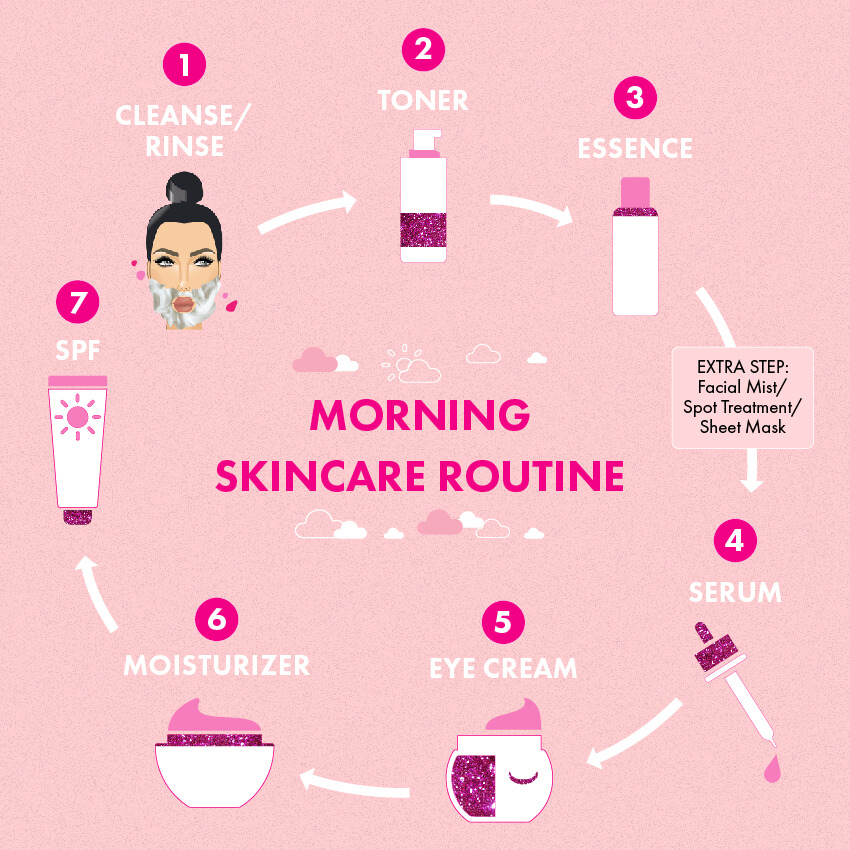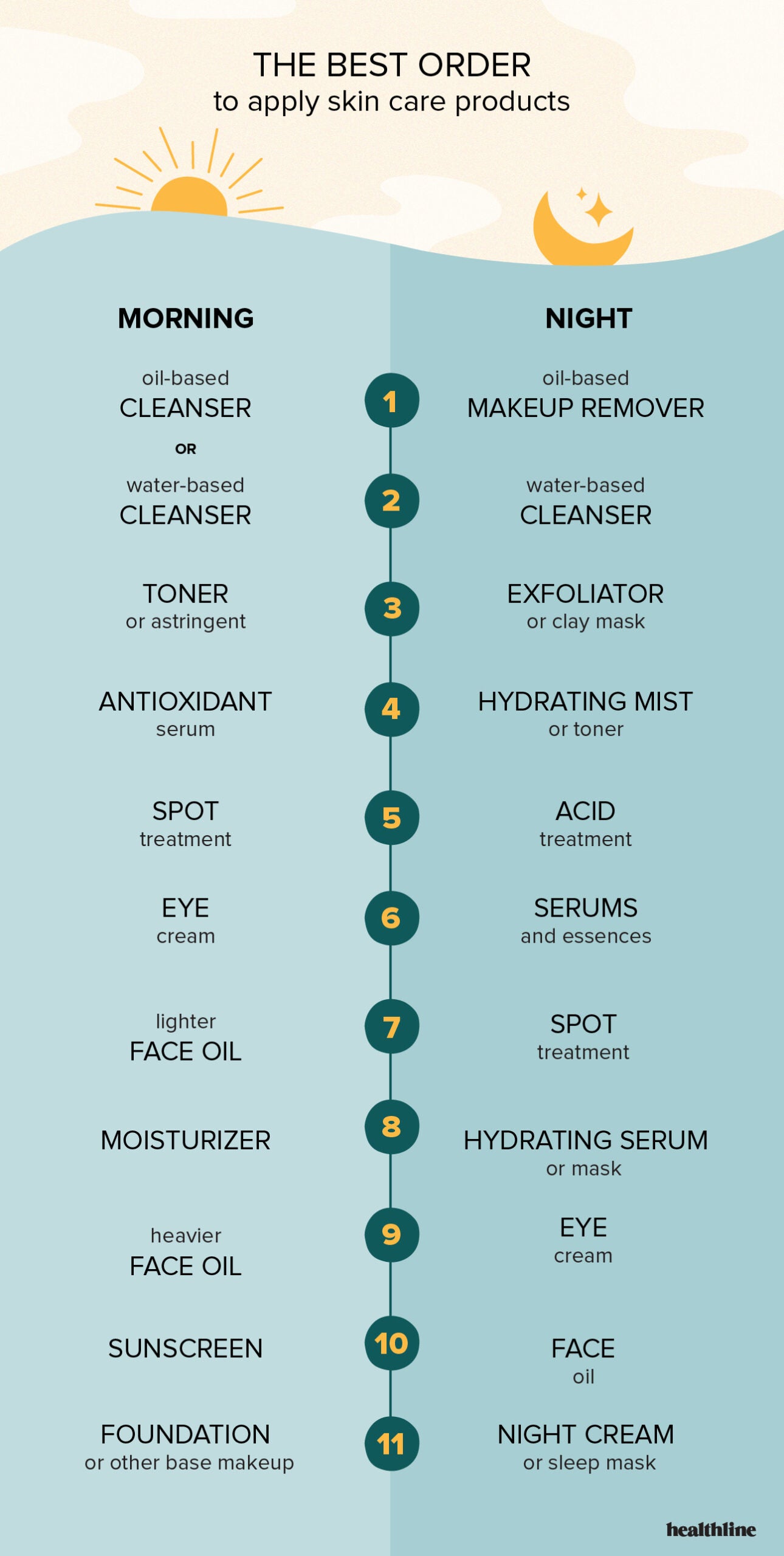Sunscreen is a crucial part of any skincare routine. It protects your skin from harmful UV rays.
Many people wonder what step sunscreen should be in their daily skincare regimen. Understanding this can help you achieve healthy, glowing skin. Sunscreen acts as a shield, preventing sun damage and premature aging. It is essential to know when to apply it for the best results.
Most experts recommend using sunscreen as the last step in your morning routine, after moisturizer. This placement ensures that it effectively protects your skin throughout the day. Knowing the right order of skincare products can make a big difference in how your skin looks and feels. Let’s explore the best way to incorporate sunscreen into your routine.
The Essence Of Sun Protection
Sun protection is vital in any skincare routine. It prevents skin damage and keeps your skin healthy. Many people overlook sunscreen. This can lead to serious skin issues later. Understanding the importance of sunscreen can change that.
Why Sunscreen Is A Skincare Staple
Sunscreen is essential for everyone. Here are a few reasons why:
- Prevents Sunburn: Sunscreen helps stop painful sunburns.
- Reduces Aging: It slows down signs of aging, like wrinkles.
- Prevents Skin Cancer: Regular use lowers the risk of skin cancer.
- Even Skin Tone: Sunscreen helps maintain a clear and even skin tone.
Using sunscreen daily is a simple step. It protects your skin from harmful effects.
Uv Rays And Skin Damage
UV rays are harmful. They come from the sun and can damage your skin.
| Type of UV Ray | Effect on Skin |
|---|---|
| UVA | Pensetrates deep, causing aging and wrinkles. |
| UVB | Causes sunburn and contributes to skin cancer. |
Both types of UV rays can lead to serious damage. Sunscreen acts as a shield against these rays. Choose a broad-spectrum sunscreen for the best protection.
Apply it every day, even on cloudy days. UV rays can reach you even without direct sunlight.
Anatomy Of A Skincare Routine
A skincare routine is important for healthy skin. Each step has a specific purpose. Understanding this can help you achieve better results. Among these steps, sunscreen plays a crucial role.
Laying The Foundation
Before applying any products, start with a clean face. Cleansing removes dirt and oil. This allows other products to work effectively.
Next, use a toner. Toner helps to balance the skin’s pH. It also prepares your skin for moisturizers and serums.
Typical Steps In Skin Care
Here’s a simple breakdown of a typical skincare routine:
| Step | Purpose |
|---|---|
| 1. Cleanser | Removes dirt and impurities. |
| 2. Toner | Balances skin pH. |
| 3. Serum | Treats specific skin concerns. |
| 4. Moisturizer | Hydrates and locks in moisture. |
| 5. Sunscreen | Protects from UV rays. |
Sunscreen is the last step in your routine. It protects your skin from harmful UV rays. Use a broad-spectrum sunscreen with SPF 30 or higher. Apply it generously and reapply every two hours.
- Choose a sunscreen that suits your skin type.
- Consider water-resistant formulas for outdoor activities.
- Don’t forget to apply it on cloudy days too.
Incorporating sunscreen daily is vital. It helps prevent premature aging and skin cancer. Make it a habit to apply sunscreen every day.
Decoding Sunscreen Formulations
Sunscreen is vital for skin protection. Understanding its formulations helps you choose the right one. Two main types exist: physical and chemical. Each has unique properties and benefits.
Physical Vs. Chemical Sunscreens
Physical sunscreens use minerals like zinc oxide and titanium dioxide. They sit on the skin’s surface. They reflect and scatter UV rays. This provides immediate protection after application.
Chemical sunscreens absorb UV rays. They contain organic compounds like avobenzone and octisalate. These ingredients change UV rays into heat. This heat then dissipates from the skin.
Physical sunscreens are often better for sensitive skin. They are less likely to cause irritation. Chemical sunscreens may feel lighter on the skin. Choose based on your skin type and preference.
Spf Ratings Explained
SPF stands for Sun Protection Factor. It measures how well a sunscreen protects against UVB rays. A higher SPF means more protection. For example, SPF 30 blocks about 97% of UVB rays.
SPF ratings do not measure UVA protection. Look for broad-spectrum labels for full protection. Reapply sunscreen every two hours for best results. Using enough product also matters. Aim for one ounce for full-body coverage.
Always check the expiration date. Old sunscreen may not work as well. Protecting your skin is essential for long-term health.
Appropriate Timing For Sunscreen
Using sunscreen at the right time is key for effective protection. It helps shield your skin from harmful UV rays. Understanding when to apply sunscreen can improve your skincare routine.
Before Or After Moisturizer?
Applying sunscreen correctly is essential. Here’s a simple guide:
- Use moisturizer first.
- Let it absorb into the skin for a few minutes.
- Then, apply sunscreen on top.
Moisturizer hydrates your skin. Sunscreen acts as a barrier. This order ensures the skin is well protected.
Sunscreen And Makeup Application
For those who wear makeup, sunscreen application can change slightly:
- Start with clean skin.
- Apply moisturizer.
- After it absorbs, use sunscreen.
- Once sunscreen is dry, apply makeup.
Some makeup products contain SPF. However, they may not provide enough protection. Always use a dedicated sunscreen.
Consider using a setting spray with SPF for extra protection. Reapply sunscreen every two hours if you are outdoors.
Reapplication And Duration
Reapplying sunscreen is essential for effective skin protection. Sunscreen does not last all day. Knowing how often to reapply makes a big difference. Here, we discuss the frequency of reapplication and how long sunscreen lasts on your skin.
Frequency Of Sunscreen Reapplication
Reapply sunscreen every two hours. This is the standard guideline for most situations. If you swim or sweat a lot, reapply more often. Look for water-resistant formulas for better protection.
Even on cloudy days, UV rays can still harm your skin. Don’t skip applying sunscreen just because it’s overcast. Always have a backup option available. Use sunscreen even if you stay indoors. UV rays can penetrate windows.
Sunscreen Longevity On Skin
The effectiveness of sunscreen can fade over time. Most sunscreens last about two hours after application. After that, their protective qualities decrease. Some products may claim longer protection. Always check the label for specific details.
Factors like heat, humidity, and physical activity affect longevity. Sweating can wash away sunscreen. Water exposure can also reduce its effectiveness. Reapply sunscreen after swimming or heavy sweating.
Be mindful of expiration dates. Old sunscreen may not offer the same protection. Always use fresh products for the best results. Take care of your skin by staying protected.

Credit: www.healthline.com
Sunscreen For Different Skin Types
Choosing the right sunscreen is key for healthy skin. Different skin types need different care. Oily, dry, and sensitive skin all have unique needs. Using the right formula helps protect and nourish your skin.
Understanding these needs is vital. Each skin type reacts differently to products. Let’s explore the best sunscreens for each type.
Formulas For Oily, Dry, And Sensitive Skin
Oily skin benefits from lightweight formulas. Gel-based sunscreens are ideal. They absorb quickly and reduce shine.
Dry skin needs extra hydration. Creamy sunscreens with moisturizing ingredients work well. Look for products with hyaluronic acid or glycerin.
Sensitive skin requires gentle formulas. Choose sunscreens free from fragrances and harsh chemicals. Mineral sunscreens with zinc oxide are often a good choice.
Non-comedogenic And Hypoallergenic Options
Non-comedogenic sunscreens do not clog pores. This is great for oily and acne-prone skin. Look for labels that state “non-comedogenic.”
Hypoallergenic options reduce the risk of allergic reactions. These are suitable for sensitive skin types. Always check the ingredients before use.
Common Sunscreen Myths Debunked
Many people have misconceptions about sunscreen. These myths can lead to skin damage. Let’s explore some common myths and the truths behind them.
No Need For Sunscreen On Cloudy Days?
Many believe that sunscreen is unnecessary when it’s cloudy. This is not true. Up to 80% of UV rays can pass through clouds. Even on a gray day, your skin is at risk. Here are some key points:
- UV Radiation: UV rays can cause skin damage.
- Skin Cancer Risk: Regular use of sunscreen lowers this risk.
- Daily Protection: Sunscreen should be a daily habit.
Always apply sunscreen, even if you can’t see the sun. Protect your skin every day for better health.
Can Makeup Replace Sunscreen?
Some think that makeup with SPF can replace sunscreen. This is a common mistake. Makeup often does not provide enough protection. Here’s why:
| Makeup Type | SPF Level | Protection Duration |
|---|---|---|
| Foundation | Usually low (SPF 15 or less) | Needs reapplication |
| Powder | Varies (often less than SPF 30) | Short-term only |
| Setting Spray | SPF can be helpful | Limited effectiveness |
Makeup can provide some protection but is not enough. Always apply sunscreen first. Use makeup on top for added benefits.

Credit: hudabeauty.com
Enhancing Sun Protection
Sunscreen is a crucial part of skincare. It protects against harmful UV rays. Using sunscreen alone isn’t enough. Other products and habits can boost your sun protection. This section discusses ways to enhance your sun defense.
Complementary Products For Extra Defense
Combining sunscreen with other products can improve skin protection. Consider these complementary products:
- Antioxidant Serums: Products with vitamin C can fight free radicals.
- Moisturizers: Hydrated skin is healthier and better protected.
- Makeup with SPF: Some makeup products offer added sun protection.
- Protective Clothing: Wear hats and UV-blocking fabrics.
Use a combination for the best results. Layering products can provide extra defense.
Lifestyle Changes For Better Skin Health
Simple lifestyle changes can enhance sun protection. These habits help maintain skin health:
- Stay Hydrated: Drink plenty of water for skin elasticity.
- Eat Antioxidant-Rich Foods: Include berries, nuts, and green leafy vegetables.
- Avoid Sun Exposure: Stay indoors during peak hours.
- Get Regular Check-ups: Visit a dermatologist for skin assessments.
Implementing these changes can improve your skin’s resilience.

Credit: www.healthline.com
Frequently Asked Questions
What Role Does Sunscreen Play In Skincare?
Sunscreen is essential in skincare to protect your skin from harmful UV rays. It prevents sunburn, premature aging, and skin cancer. Incorporating sunscreen into your daily routine helps maintain skin health and promotes an even complexion. Choose a broad-spectrum sunscreen with at least SPF 30 for optimal protection.
When Should I Apply Sunscreen?
Apply sunscreen every morning, even on cloudy days. For best results, use it as the last step in your skincare routine. Reapply every two hours if you’re outdoors or sweating. Remember, consistent application is key to effective sun protection and maintaining healthy skin.
Can I Skip Sunscreen On Cloudy Days?
No, you should not skip sunscreen on cloudy days. Up to 80% of UV rays can penetrate clouds, causing skin damage. Even when it’s overcast, harmful rays can still affect your skin. Always apply sunscreen daily, regardless of the weather, for optimal protection.
Is Sunscreen Necessary For Indoor Use?
Yes, sunscreen is necessary even when indoors. UVA rays can penetrate windows and harm your skin. If you spend long hours in front of screens or near windows, applying sunscreen is essential. Protecting your skin indoors helps prevent long-term damage and maintains a healthy appearance.
Conclusion
Sunscreen plays a vital role in skincare. It protects your skin from harmful UV rays. Applying it daily helps prevent sunburn and skin damage. Choose a broad-spectrum sunscreen for the best protection. Make it a habit to apply before going outside.
Remember, even cloudy days require sunscreen. Healthy skin today leads to better skin tomorrow. Prioritize sunscreen in your routine. Your skin deserves this simple step for lasting health. Enjoy the sun safely while keeping your skin safe.







